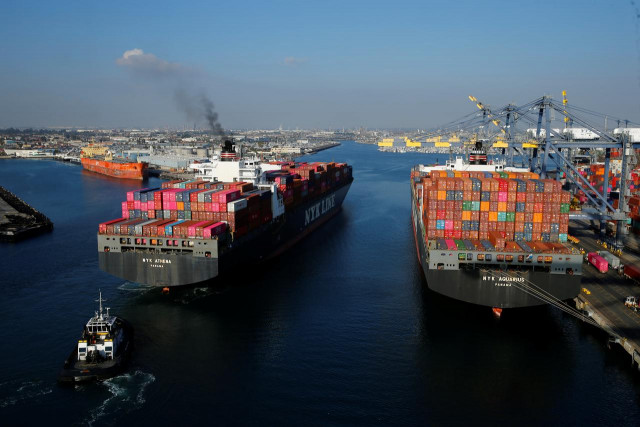Tensions over Kashmir to impact economies of region
Dream of ‘Ache Din’ and ‘Naya Pakistan’ cannot be fulfilled through hatred

PHOTO: REUTERS
If you are a number geek, then you must have spotted that these numbers do not match with Pakistan Automobile Manufacturers Association (Pama) report for July 2019. Well, you are right, these are not the numbers from Pakistan, they are from across the border, India.
The decline in auto sales is not an isolated event and the effect of economic slowdown in India is reflected in other areas of the economy as well such as textile, banking and financial sectors and the Indian rupee lost 4.4% in August, making it the worst-performing currency in Asia.
The situation is so bad that the Modi government had to turn to the Reserve Bank of India (RBI) to fork out INR 1.76 trillion to resuscitate the ailing economy, the amount that suspiciously matched the budget deficit.
The Modi government, while further disturbing the already fragile global economic landscape, out of the blue decided to meddle in the internationally recognised disputed region of Jammu and Kashmir. While the world was still coming to terms with the effect of a trade war between China and the US, the recent aggressive moves by India have created risk of a real war with her nuclear-armed archrival.
Despite the argument by the Modi-led National Democratic Alliance (NDA) that it was part of its election manifesto, the Bloomberg termed India’s recent action “shooting itself in the foot”.
If we look globally, then it is evident that the rise of nationalism and inward-looking policies have created a chaos around the globe with countries promoting right-wing politics or closing their borders either to curb the inflow of immigrants or the outflow of local jobs.
The recent escalation in tensions between the two archrivals is only going to make the already gloomy global outlook gloomier and the escalation cannot be ignored for long by the global powers who are direct or indirect stakeholders in the region due to one reason or the other.
A further escalation, which may lead to the closure of Pakistani airspace to India and eventually the trade route to Afghanistan, can have a detrimental effect on the already ailing aviation industry of India.
Recently, many fuel suppliers have restricted the refueling of Air India planes due to arrears of $700 million towards three state-owned oil companies. Also, the companies near the border of Pakistan, which rely heavily on exports to Pakistan and Afghanistan, may be affected badly.
All these and many more developments are going to negatively impact economies of the entire region without even firing a single bullet. Now imagine if the escalation pushes both sides to the war, then the fate of 1.6 billion people or about a quarter of the world population, mostly young and skillful, will hang in the balance.
Policymakers in the region, where people are still struggling for basic necessities of life, are spending their scarce resources to buy better and more lethal weapons to destroy each other and the recent spending of $8 billion to buy Rafael fighter jets by the Indian Air Force is a prime example of such misplaced priorities.
The hard economic fact is that the dream of “Ache Din” in India or “Naya Pakistan” cannot be fulfilled through hatred, war-mongering, extremism and right-wing jingoism. Now, the onus is on the leadership of both the countries to rise to the challenge, especially when the consequence of an irrational decision does not mean just a war but annihilation.
The writer is a financial market enthusiast and attached to Pakistan’s stocks, commodities and emerging technology
Published in The Express Tribune, Septembert 2nd, 2019.
Like Business on Facebook, follow @TribuneBiz on Twitter to stay informed and join in the conversation.



















COMMENTS
Comments are moderated and generally will be posted if they are on-topic and not abusive.
For more information, please see our Comments FAQ